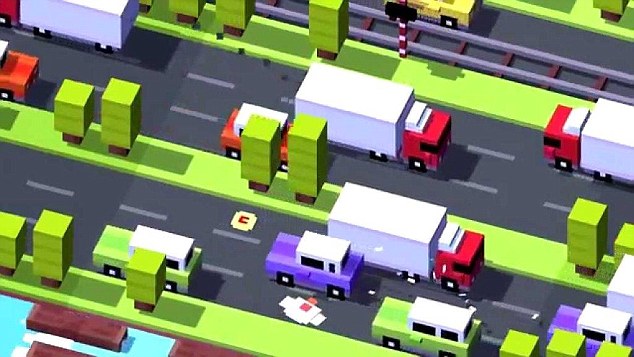Crossy Road leaving you frustrated? Mobile games are trickier than console titles due to our bungling fingers, finds study
- Researchers have identified three key areas making touchscreens trickier
- Wobbly fingers, not feeling the screen, and slow sensors are to blame
- Touchscreens may never beat physical keys in gaming, study said
- Study could predict how well different players will perform at a game
If the thought of playing touchscreen games such as Crossy Road makes you want to hurl your smartphone across the room in annoyance, you are not alone.
The inaccuracy of these games, compared to those which rely on physical buttons, has long been a source of irritation for gamers.
Jabbing angrily at the screen, as the game doesn't quite do what you told it to, is a familiar feeling for many of us.

If the thought of playing touchscreen games such as Crossy Road (pictured) makes you want to hurl your smartphone across the room in annoyance, you are not alone. The inaccuracy of these games, compared to those which rely on physical buttons, has long been a source of irritation for gamers
In fact, many 'serious' gamers will shun touchscreen devices altogether.
Until now, there was no scientific explanation for why games made for these devices produce such imprecise results.
But a study has now shown it all comes down to timing.
Scientists from Aalto University in Finland compared the performance of gamers using touchscreens, and others using buttons, when playing games that require accurate timing.
They found that those using physical keys timed their moves more precisely.
'We can finally explain why games that require accurate timing are annoyingly hard on touchscreens.' claimed one of the researchers Professor Antti Oulasvirta.
The study identified three major reasons (classed as physical, predictability, and processing) why touchscreen control is less reliable for timing than physical buttons.
The first is that we can't keep our fingers still, labelled as 'physical limitation' in the paper.
With physical input, gamers can rest their digits comfortably on the console buttons before pressing when the time is right.
Touchscreen users have to hover their fingers; the slightest wobble will mean that their timing is thrown off.
Secondly, we aren't sure when we've touched the screen, dubbed the 'predictability' issue.
The familiar 'click' of a button when playing a game reassures us that we have made the response.

The study identified three major reasons why touchscreen control is less reliable for timing than physical buttons - we can't keep our fingers still, we aren't sure when we've touched the screen, dubbed the ' predictability ' issue, and the ' processing ' issue is caused because the screen is slower to react than buttons

The researchers hope that if touchscreen games can be developed to better detect when fingers have made contact with the screen, timing accuracy (and therefore performance) will improve. The study has also provided a model which could predict how often a player will make mistakes in Flappy bird (pictured)
Tapping a touchscreen is harder for the nerves in our fingers to detect, meaning our reaction can be more hesitant.
And lastly, the 'processing' issue is caused because the touchscreen is slower to react than buttons.
Processing the fact that a finger has pressed the touchscreen can result in more of a 'lag' in the gaming console than if a button had been clicked.
The researchers hope that if touchscreen games can be developed to better detect when fingers have made contact with the screen, timing accuracy (and therefore performance) will improve.
This will solve problems two and three; but making a way for us to keep our fingers steady could prove a more difficult issue.
'Unfortunately, the theory suggests touchscreens may never be able to beat physical keys in gaming,' explained Professor Antti Oulasvirta.
'The reason is that the finger travel distance varies and creates a source of unpredictability.'
However, he was optimistic the scientific model his team had produced about finger mass could help to improve the accuracy of games in the future, by making predictions on how often a player will make errors in the popular touchscreen game Flappy Bird.
'Our model can predict how many points a gamer is able to score in that game.'
If the player is prone to making too many mistakes, it may indicate that the sensitivity of the game needs to be improved; hopefully making a more enjoyable experience for users.
The full study can be read here.
Most watched News videos
- TikTokers provide inside look at the line for Bonnie Blue's marathon
- Man declares 'mission accomplished' as he gives Bonnie Blue a cap
- Incredible moment homeless mum dog carries dying pup to vets
- Moment Russian influencer throws two-month-old son into a snowdrift
- Shocking moment transgender girl is set upon by masked teenage mob
- Shocking moment woman hits a police officer and leaves her in tears
- Fiery debris falls over Turks and Caicos Islands after SpaceX explosion
- Woman is arrested for bad behavior at Ohio car wash
- Moment 'trans hate mob' ringleader Summer Betts-Ramsey is arrested
- Shocking moment transgender girl is set upon by masked teenage mob
- Brazilian martial artist tackles handbag thief to the ground
- California grandma remains positive despite losing home in fires















































































































































































